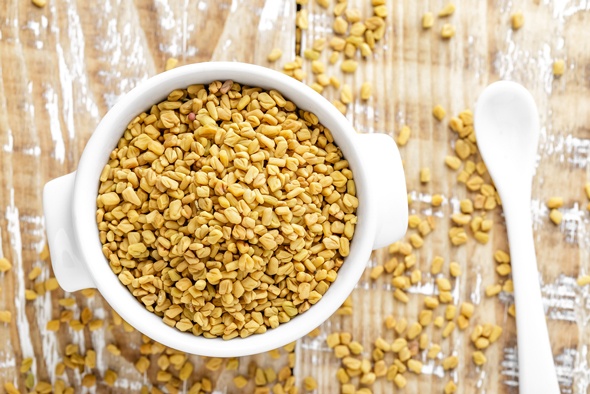Fenugreek seeds (Trigonella foenum-graecum) have a long history in the culinary and medicinal worlds. Egyptians, Romans and Indians used the seeds for embalming, as cattle fodder, and to improve digestion. Recently there has been some impressive research on fenugreek’s role in managing diabetes, increasing breast milk production, and improving body composition and sexual function in men.

Diabetes
As of 2014, one out of every 11 Americans had diabetes, and 1 in 3 will develop it at some point over their lifespan. The hallmark of diabetes is high blood glucose, which can lead to many complications. One of the most significant is the risk of cardiovascular disease. Interestingly, fenugreek has been shown in various studies to lower blood glucose and HbA1c levels (a marker of high blood glucose), increase insulin secretion and lower LDL and VLDL cholesterol and triglycerides. Fenugreek works similarly to insulin by increasing the amount of glucose that gets into muscles. It also seems to have an impact on the liver by reducing the buildup of triglycerides, and in turn reducing the risk of developing fatty liver disease. Liver enzymes have also been shown to decrease after consuming an extract of fenugreek, which may signify reduced inflammation.
Blood glucose, HbA1c and lipids are the very measurements that are taken to determine risks of developing complications due to diabetes, so keeping them in check – through diet, lifestyle, supplements such as fenugreek, and medications when needed – will have a significant impact on the quality of life of a person with diabetes.
Strength Training
A study of 49 resistance-trained men supplementing with fenugreek showed some impressive results on body composition and strength. Compared to a placebo group, the men taking the fenugreek supplement decreased their body fat percentage and had greater increases in upper and lower body strength. This could be a safe addition to your strength training routine…
Hormones
Traditionally, fenugreek has been associated with hormonal issues, such as male impotence and low breastmilk production. A study using an extract of fenugreek along with magnesium, Zinc and Vitamin B6 examined its effects compared to placebo on healthy males with low libido without sexual dysfunction. After 6 weeks, all of the men taking the supplement reported increases on their sexual functioning-self report questionnaire, whereas none of the placebo group noted a change. Hormones were measured in the group taking the supplement and the control group but there was no significant change. In this case, as in many studies, researchers can see an effect, but still not know why it’s happening. Time for more research.
Fenugreek is the most commonly used herbal galactagogue (a substance believed to increase breast milk supply) in the world. It may be acting as a phytoestrogen, but again, we don’t really know how it works. A study in Turkey divided mother and infant pairs into 3 groups: in one the mothers drank fenugreek tea, in the second group the mothers drank an apple tea as placebo, and in the third group the mothers simply received advice. The mothers who drank the fenugreek tea pumped almost twice the amount of breastmilk as the other two groups. The fenugreek infants also lost less weight than the placebo groups and regained their birth weight earlier. These are very significant findings. When infants don’t regain their birth weight within a week, many women fear that their milk supply is too low and begin supplementation with formula, which further decreases the supply of breast milk. Seeking the support of a lactation consultant and starting out early drinking fenugreek tea can be very helpful in getting off to a good start with breastfeeding.
Fenugreek seeds can be ground into a powder and added to foods, drunk as tea or taken as a standardized extract. Some people have noted some abdominal discomfort for a few days after starting fenugreek. Others have noted a reduction in their appetite. If you have diabetes, be sure to work with your doctor and monitor your blood glucose levels frequently if starting a new supplement.
Need help incorporating fenugreek seeds into your diet? Schedule an appointment with one of our nutritionists today.
By Kathryn C., Bastyr University student intern
References
- Haber, S. L., and J. Keonavong. “Fenugreek Use In Patients With Diabetes Mellitus”. American Journal of Health-System Pharmacy 70.14 (2013): 1196-1203. Web.
- Poole, Chris et al. “The Effects Of A Commercially Available Botanical Supplement On Strength, Body Composition, Power Output, And Hormonal Profiles In Resistance-Trained Males”. Journal of the International Society of Sports Nutrition 7.1 (2010): 34. Web.
- Steels, Elizabeth, Amanda Rao, and Luis Vitetta. “Physiological Aspects Of Male Libido Enhanced By Standardized Trigonella Foenum-Graecum Extract And Mineral Formulation”. Phytotherapy Research (2011): n/a-n/a. Web.
- Turkyılmaz, Canan et al. “The Effect Of Galactagogue Herbal Tea On Breast Milk Production And Short-Term Catch-Up Of Birth Weight In The First Week Of Life”. The Journal of Alternative and Complementary Medicine 17.2 (2011): 139-142. Web.
Image Source: https://authoritynutrition.com/fenugreek/
